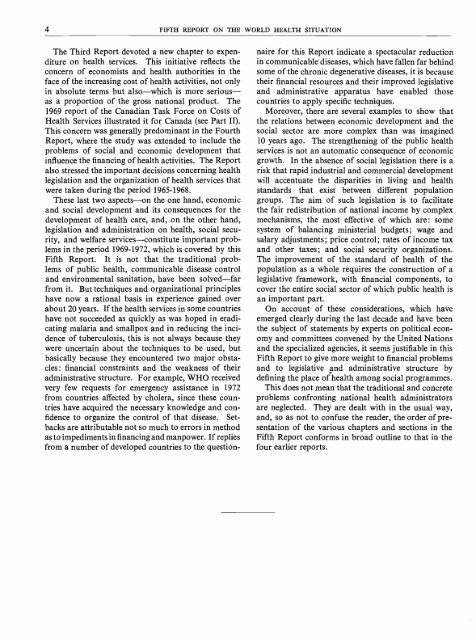FIFTH REPORT - World Health Organization
FIFTH REPORT - World Health Organization
FIFTH REPORT - World Health Organization
You also want an ePaper? Increase the reach of your titles
YUMPU automatically turns print PDFs into web optimized ePapers that Google loves.
4 <strong>FIFTH</strong> <strong>REPORT</strong> ON THE WORLD HEALTH SITUATION<br />
The Third Report devoted a new chapter to expenditure<br />
on health services. This initiative reflects the<br />
concern of economists and health authorities in the<br />
face of the increasing cost of health activities, not only<br />
in absolute terms but also -which is more serious -<br />
as a proportion of the gross national product. The<br />
1969 report of the Canadian Task Force on Costs of<br />
<strong>Health</strong> Services illustrated it for Canada (see Part II).<br />
This concern was generally predominant in the Fourth<br />
Report, where the study was extended to include the<br />
problems of social and economic development that<br />
influence the financing of health activities. The Report<br />
also stressed the important decisions concerning health<br />
legislation and the organization of health services that<br />
were taken during the period 1965 -1968.<br />
These last two aspects -on the one hand, economic<br />
and social development and its consequences for the<br />
development of health care, and, on the other hand,<br />
legislation and administration on health, social security,<br />
and welfare services -constitute important problems<br />
in the period 1969 -1972, which is covered by this<br />
Fifth Report. It is not that the traditional problems<br />
of public health, communicable disease control<br />
and environmental sanitation, have been solved -far<br />
from it. But techniques and organizational principles<br />
have now a rational basis in experience gained over<br />
about 20 years. If the health services in some countries<br />
have not succeeded as quickly as was hoped in eradicating<br />
malaria and smallpox and in reducing the incidence<br />
of tuberculosis, this is not always because they<br />
were uncertain about the techniques to be used, but<br />
basically because they encountered two major obstacles:<br />
financial constraints and the weakness of their<br />
administrative structure. For example, WHO received<br />
very few requests for emergency assistance in 1972<br />
from countries affected by cholera, since these countries<br />
have acquired the necessary knowledge and confidence<br />
to organize the control of that disease. Setbacks<br />
are attributable not so much to errors in method<br />
as to impediments in financing and manpower. If replies<br />
from a number of developed countries to the questionnaire<br />
for this Report indicate a spectacular reduction<br />
in communicable diseases, which have fallen far behind<br />
some of the chronic degenerative diseases, it is because<br />
their financial resources and their improved legislative<br />
and administrative apparatus have enabled those<br />
countries to apply specific techniques.<br />
Moreover, there are several examples to show that<br />
the relations between economic development and the<br />
social sector are more complex than was imagined<br />
10 years ago. The strengthening of the public health<br />
services is not an automatic consequence of economic<br />
growth. In the absence of social legislation there is a<br />
risk that rapid industrial and commercial development<br />
will accentuate the disparities in living and health<br />
standards that exist between different population<br />
groups. The aim of such legislation is to facilitate<br />
the fair redistribution of national income by complex<br />
mechanisms, the most effective of which are: some<br />
system of balancing ministerial budgets; wage and<br />
salary adjustments; price control; rates of income tax<br />
and other taxes; and social security organizations.<br />
The improvement of the standard of health of the<br />
population as a whole requires the construction of a<br />
legislative framework, with financial components, to<br />
cover the entire social sector of which public health is<br />
an important part.<br />
On account of these considerations, which have<br />
emerged clearly during the last decade and have been<br />
the subject of statements by experts on political economy<br />
and committees convened by the United Nations<br />
and the specialized agencies, it seems justifiable in this<br />
Fifth Report to give more weight to financial problems<br />
and to legislative and administrative structure by<br />
defining the place of-health among social programmes.<br />
This does not mean that the traditional and concrete<br />
problems confronting national health administrators<br />
are neglected. They are dealt with in the usual way,<br />
and, so as not to confuse the reader, the order of presentation<br />
of the various chapters and sections in the<br />
Fifth Report conforms in broad outline to that in the<br />
four earlier reports.
















